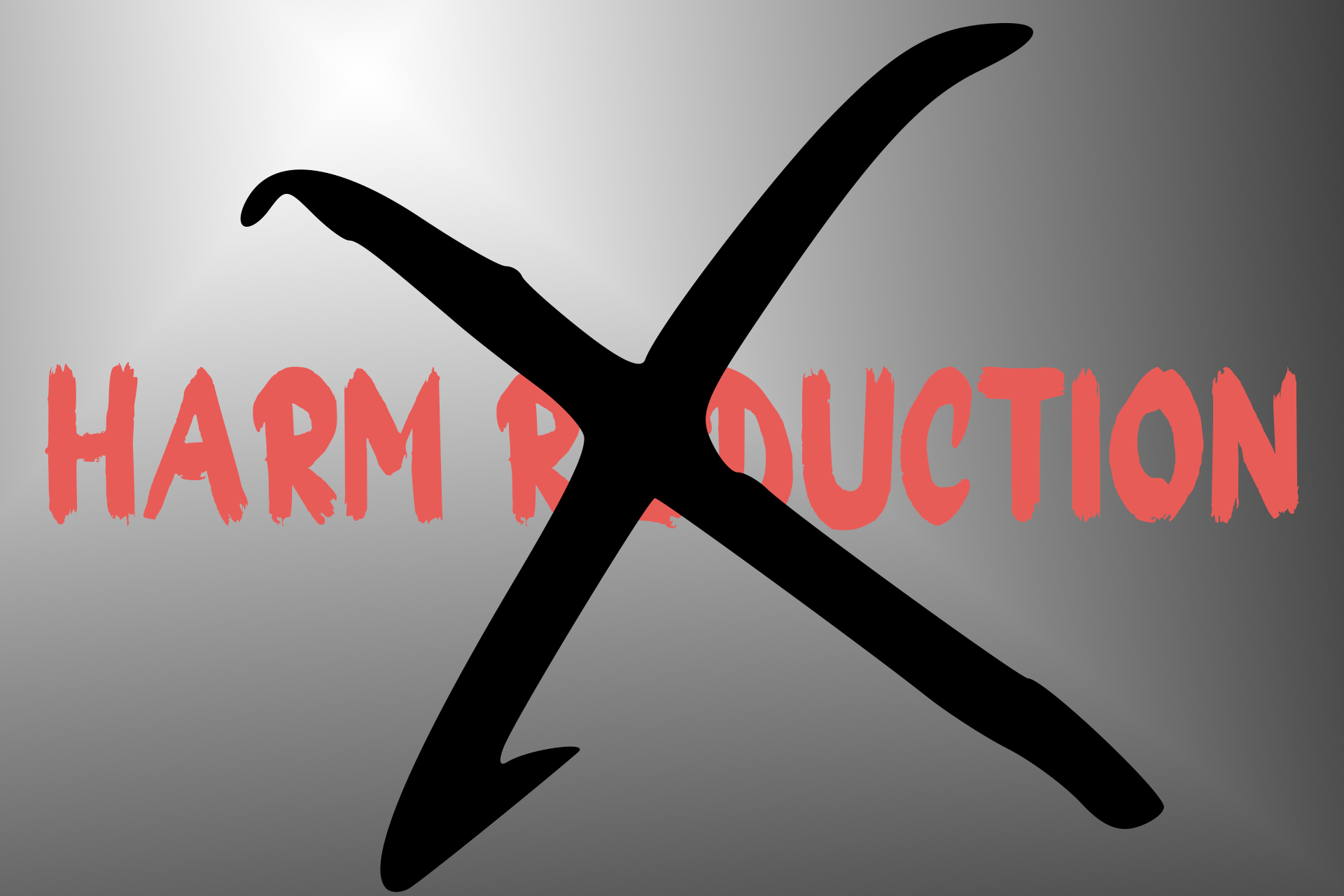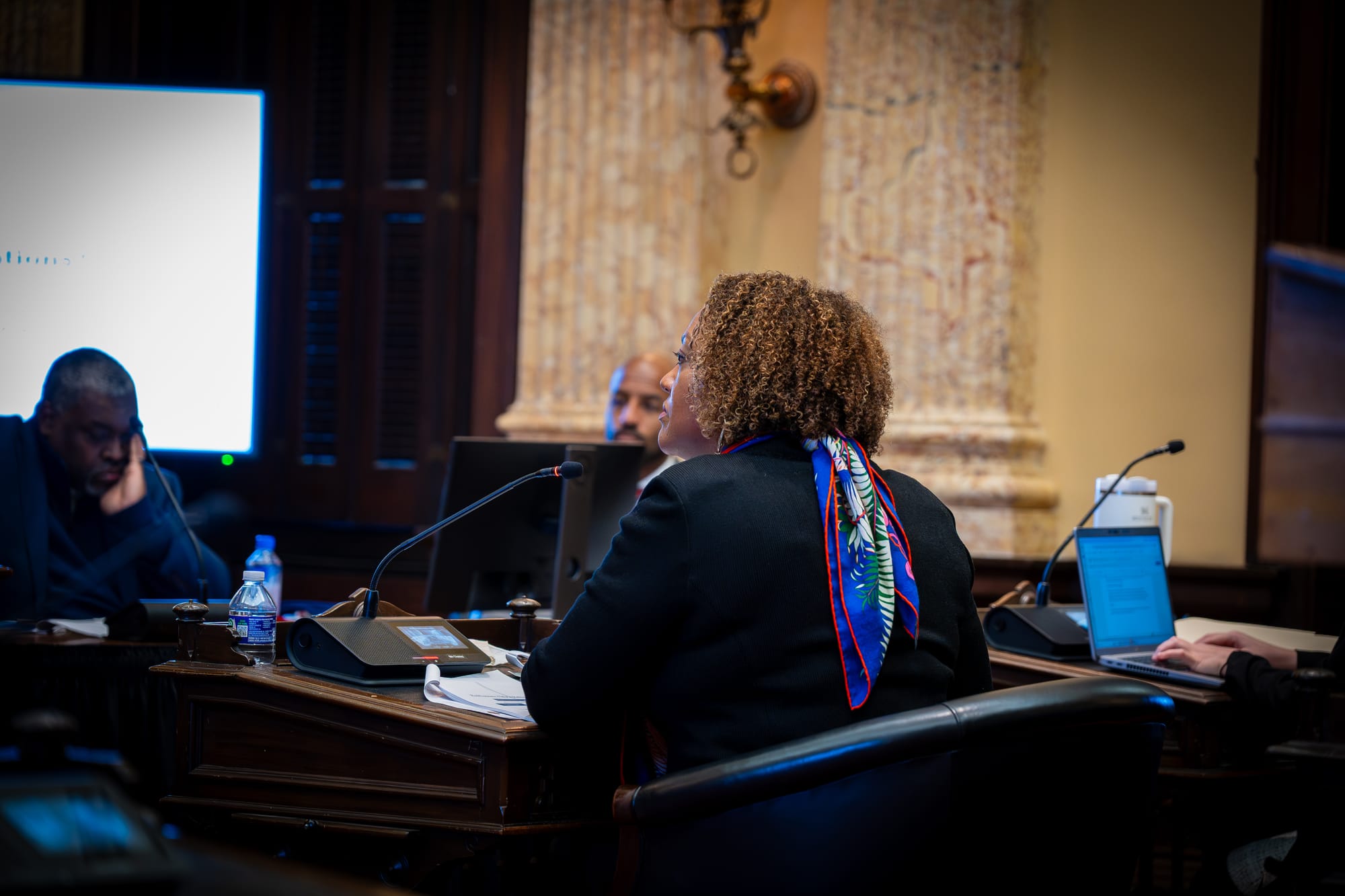
Sitting alongside city officials and public health workers earlier this week, U.S. Sen. Angela Alsobrooks swore to protect Medicaid as proposed funding cuts threaten to hamper Baltimore's response to the overdose crisis.
Yet the moderate Democrat's visit for a panel discussion at the Johns Hopkins University School of Nursing also came as her party struggles to fend off a much more extensive assault on public health by far-right conservatives. With a legislative trifecta, Republicans have weaponized fears about fentanyl to advance a fascist agenda — one that would fan the flames of the War on Drugs by demonizing immigrants, those who use or sell drugs and other vulnerable populations. In response, Baltimore harm reductionists have doubled down on their demand for progressive drug policies to curb overdose deaths.
Alsobrooks has instead taken a centrist lane, attempting to strike a balance between evidence-based public health policies and the desire to maintain a well-funded law enforcement response that oftentimes exacerbates the crisis.
"I think it's a basic civil right to live in a place that is safe, but I also think it is a basic civil right to be able to access the health care that you need," Alsobrooks told Mobtown Redux.
"Whether that is addiction care or mental health care, I don't believe that anyone in our community should have to choose between whether to live somewhere safe or to have the health care that your family member needs. I think the Republican choice is a false choice."
In her short time in the Senate, Alsobrooks has been relatively solid on drug policy-related votes. She and Sen. Chris Van Hollen opposed the HALT Fentanyl Act, which would permanently ban fentanyl analogs under Schedule I of the Controlled Substances Act and expand mandatory minimum sentencing. Iterations of the bill were passed in both chambers earlier this year, with 30 of her Democratic colleagues voting for it in the Senate.
In addition, she vehemently opposed the nomination of U.S. Health and Human Services Secretary Robert F. Kennedy Jr., who has proposed sending those with substance use disorder to glorified labor camps.
Alsobrook's views on drug policy nonetheless lack a harm reduction perspective, which public health experts widely consider to be the gold standard of overdose prevention. Instead, she has focused on an abstinence-based approach.
"I'm not an expert in this field, but I am a person who cares deeply about this issue," Alsobrooks said. "It is one that we have the capacity, if we care enough, to bring about the kind of investment that will help us have our families live free of addiction and to have the kind of health response that is necessary," Alsobrooks said.
Although federal law can heavily influence drug policy on the local level, the senator added that it will ultimately be up to local officials to determine Baltimore's public health priorities.
Locally, a growing consensus has formed around the importance of harm reduction as officials look to redress an unprecedented overdose crisis. But like Alsobrooks, Mayor Brandon Scott has attempted to mix evidence-based health initiatives with policing — a strategy predicated on the flawed argument that drug enforcement reduces violent crime and overdoses.
Even so, specific harm reduction strategies were not discussed in detail at the event on Thursday.
The health workers and public officials instead focused on concerns about federal funding for Medicaid and other programs. Just one week earlier, House Republicans passed a budget bill that includes nearly $700 billion in cuts to the program.
"Changes in funding streams for housing, transportation, food security and health care through Medicaid also all going to have a significant impact on our ability to address all of the factors involved in the overdose crisis," said Jennifer Martin, deputy commissioner of the Baltimore City Health Department's Division of Population Health and Disease Prevention.
About 180,000 Baltimoreans are covered by Medicaid for SUD, mental health and behavioral health services alone, meaning nearly one-third of the city's population relies on the program for those types of care. More than 32,000 individuals rely on it for SUD services alone, and funding cuts could hamper health care coverage for those at highest risk of overdoses.
While Medicaid is a crucial tool to keep those who use drugs alive by providing them the fundamental human right of health care, it is just one of many programs in the crosshairs of President Donald Trump.
The GOP budget also proposes slashing billions in funding to the Centers for Disease Control and Prevention and the Substance Abuse and Mental Health Services Administration, both of which play a crucial role in overdose prevention.
Trump's administration is also facing legal challenges as it attempts to cancel billions of dollars in funding for local health departments and halt additional billions in grant and loan funding to nonprofits, including harm reduction organizations.
Bakari Atibta, community leadership coordinator at Charm City Care Connection and a panelist at Thursday's event, said 35% of the organization's funding for its outreach and drop-in services hangs in the balance because of the proposed measures.
"If we were to lose that funding... We are already struggling to provide for the increase of people we're seeing. Without that funding, we can't continue the current existing services, let alone continue to try to expand to untouched areas such as West Baltimore."
A majority of those to whom the organization provides harm reduction services are older Black men, who are at a significantly higher risk of fatal overdoses. Fatal overdose rates have historically been highest in West Baltimore.
Support for public health funding during these times is undoubtedly important; the programs talked about on Thursday are long-standing pillars of public health. Without more ambitious proposals, however, the fight tacitly accepts the bare minimum while dealing with a crisis that demands a forceful response.
In recent years, there have been few meaningful drug policy reforms proposed at the federal level to counter Republicans as they attempt to crack down on fentanyl and those who use it.
Meanwhile, this chaos comes on the heels of a historic drop in fatal overdoses nationwide, making this a critical juncture where officials' actions could either continue or reverse that momentum. In Baltimore, there were 775 overdose deaths last year, a record-breaking 26% decrease.
More recent preliminary data, which covers fatal overdoses in the 12-month period ending in April, indicates that the decline has continued. As those on the panel noted, the death rate remains astronomically high.
"I think one of the things we have to be careful of is not to be lulled into a false sense of complacency because we're seeing these numbers drop," said Carlos Hardy, a member of the city's Opioid Restitution Advisory Board and panel speaker. "They could use that to justify cutting federal funds."
In addition to funding for Medicaid and nonprofits, the budget of the city agency tasked with leading the local government's response to the crisis is also facing cuts.
City officials have said 45% of the health department's proposed $185 million budget would come from federal funding, meaning federal austerity could cripple government-led harm reduction and recovery initiatives.
The mayor's proposed budget already suggests an 11% decrease in funding, or a $23 million cut, to its budget, though it also includes an 87% to SUD and mental health funding.
With looming federal cuts, however, only the windfall of funds from the city's litigation against opioid manufacturers and distributors is guaranteed. The city's slated to receive nearly $670 million, with ongoing litigation potentially bringing in significantly more.
With a portion of those dollars, the mayor has proposed using more than $3 million to replace existing general fund dollars for health department initiatives such as its syringe service program, a controversial practice known as supplantation.
The department also plans to utilize restitution funds to hire 25 new employees and augment prevention efforts. Health officials on Wednesday announced a plan to create a new division of "public behavioral health," which will encompass its harm reduction and recovery initiatives.
The restitution dollars may buttress the city's overdose response efforts amid federal uncertainty, though some officials have noted the sum is not as massive as it may appear.
The mayor's proposed budget, for example, includes a $22 million increase to the police department’s budget — setting aside a total of $614 million for the department. That annual allocation is not much less than the entire pool of restitution funds, which is supposed to last the city 15 years.
Those numbers speak to the duality of the city's overdose crisis response and the mindset of moderate Democrats such as Alsobrooks. They acknowledge the importance of harm reduction, but they are also unable — or simply unwilling — to do away with a police-led response that advances the failed experiment of prohibition.
"For decades, this [overdose] crisis has claimed the lives of far too many individuals, especially right here in Baltimore," Scott said on Thursday. "This is personal for almost everybody in this city... We've also seen the disproportionate toll it has taken on certain communities, particularly older Black men. And while there is no blue pill, this isn't the Matrix. There is no central solution."
The assertion is correct; there is no single solution to the overdose crisis.
Yet myriad battle-tested harm reduction strategies have not been embraced, and studies have repeatedly shown that drug-war policing is not part of the solution that officials so desperately seek.
At the federal level, even funding for well-researched harm reduction strategies such as SSPs face roadblocks because federal funds can't be used for syringes themselves. Democrats have failed to meet the moment, with drug policy reform proposals virtually nonexistent as Trump and his allies weaponize fentanyl to escalate the drug war.
At the state level, bills that would legalize OPCs and decriminalize "paraphernalia" have repeatedly failed, seemingly because the more conservative Democrats in the state Senate have no appetite to save lives.
Then there's Baltimore, where Scott has embraced harm reduction, and the health department has partnered with harm reduction organizations. Despite that, leaders have only endorsed failed OPC and decriminalization efforts in the General Assembly while ducking questions about implementing them locally.
State's Attorney Ivan Bates, meanwhile, did away with his predecessor's de facto decriminalization policy, bringing a period of regression in drug policy while advocates look to move forward.
The ongoing political chaos at all levels of government serves as a stark contrast to the beautiful simplicity of harm reduction: Meet people where they are, give them what they need to stay alive and recognize their human autonomy.
As advocates demand compassionate reforms, officials have instead limited their scope to preserving the inherently flawed system that already exists.
Politicians must continue to fight to protect Medicaid and public health funding; they also must push for so much more.

Miss last week's newsletter? You'll want to check it out:
As Maryland's fatal overdose rate continues to slow after deaths plummeted throughout the U.S. last year, Gov. Wes Moore signed a budget this week that includes a modest increase in funding for substance use and mental health-related services.
The Democrat on Tuesday signed a $67 billion spending plan, which came on the heels of proposed austerity measures at the federal level that threaten to gut Medicaid and public health initiatives nationwide. Amid the looming threats, mental health and substance use disorder programs in Maryland will receive $1.47 billion, a roughly 4% increase over the year prior.
"Despite the most challenging fiscal situation in years, Maryland has remained committed to ensuring necessary funding for mental health, substance abuse, and overdose prevention resources," spokesperson Carter Elliott said in a statement to Mobtown Redux.
Click here to read the full newsletter.
Mobtown Redux's Overdose Data Dashboard is frequently updated with the latest local, state and national data:
Baltimore's overdose death toll in 2024 has increased to 775 — this is preliminary data that's subject to change as causes of death are determined. That marks a nearly 26% decrease from the year prior.
In the 12-month period ending in April, Baltimore saw 651 deaths, a death rate of 111.1 per 100,000 people. Statewide, there were 1,504 deaths, a death rate of 24.3 per 100,000 people.
Neighborhoods in West Baltimore saw the most deaths, an unfortunate pattern in this data.
Check out Mobtown Redux's Overdose Data Dashboard here.
Click here to learn more about harm reduction resources in the Baltimore area.
"Trump pardons drug kingpins even as he escalates U.S. drug war rhetoric," NPR reports:
President Trump has long called for escalating the U.S. drug war against Mexican cartels and wants tougher penalties for dealers selling fentanyl and other street drugs in American communities. "I am ready for it, the death penalty, if you deal drugs," Trump said during a meeting with state governors in February, where he said dealers are too often treated with a "slap on the wrist."
But despite his tough rhetoric, Trump has sparked controversy by pardoning a growing number of convicted drug dealers, including this week's move to grant clemency to Larry Hoover, 74, who was serving multiple life sentences in federal prison for crimes linked to his role leading the Chicago-based Gangster Disciples.
Already during the early months of his second term, Trump has granted clemency to at least eight individuals convicted on federal drug charges. Some, including Hoover, have extensive criminal records involving violence and gun charges.
Click here to read the full article.









Comments